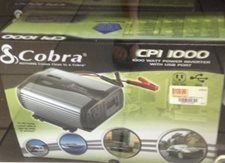What is a power inverter? Power inverters are described as a device or circuit that changes direct current (DC) to alternating current (AC). Voltages, input and output are dependent upon the device in use. For our use we will be talking about an inverter that would be installed in a truck, voltage 12 DC in and 115 AC out. The explanation of why it is called an inverter and not a converter is very lengthy, so if you must know Google power inverter and it will explain it in full. I did always wonder and now I know, but it isn't important.
The reason we use inverters in trucks varies, but the most common is to power home appliances in the

truck without finding an electrical outlet and a long power cord. Microwaves, small refrigerators, cooking devices and powering electronics. Televisions, laptops and chargers for phones and headsets, can all run off of 115 v AC more efficiently than 12 v DC. The thing is to find an inverter that will cover your needs without over doing it.
Inverters are sold by wattage ratings, 100, 150, 1500, 2500 and larger, and almost everything in between to figure out what size you need, you must look at the wattage rating of the appliance you intend to run. There is a label on the appliance that lists the wattage it consumes. Our rice cooker has an 800-watt rating, so at a minimum we would need a 1000-watt inverter. If you get an inverter that matches the appliance, it could overheat and shut down because it is working at it's maximum power level. That would be the starting point for deciding which inverter to get. One would need to add all the electrical draw of all appliances or chargers that would be plugged in at the same time to get the true wattage needed.
Let's say we are going to cook dinner in the truck. We are having salmon, green beans and brown rice. We will be cooking the rice and the salmon in the rice cooker, 800 watts. The green beans in the microwave, 900 watts. While we are cooking one of the kids call and our phone is almost dead, so it must charge while we talk and cook, 5 watts. We are using the laptop at the same time, charging it for tomorrow, 90 watts. My choice would be a 2500 watt inverter, it will handle the load and any spikes the microwave or the rice cooker may need.

I have determined how big the inverter needs to be, 2500 watts. There are options on inverters that increase the cost, but I feel they are important. Auto shutdown, this feature will shut off the inverter if it overheats or if the battery voltage gets low, this could mean the truck starting in the morning or not. Cooling fan, this will help the inverter last longer by getting rid of unwanted heat. Get a "true sine wave" inverter, a lot of less expensive inverters use a "modified sine wave" and can cause rechargeable batteries to have a shorter life. If you have expensive electronics you will want to have a "true" or "pure sine wave" inverter. The short explanation of what the "sine wave" is, the way AC electricity flows. It is a smooth "wave" that looks similar to the end of a piece of corrugated metal. Modified sine is like square blocks stacked, the flow is not smooth. Get a remote shutoff switch if available, you wont have to get under the bunk every time you want to shut it off.
Choosing an inverter is for the most part simple, add the appliances that will be running at the same time and get one a little larger. If you get one that is too big, it will consume more battery power to make the same amount of usable power. If we got a 3500 watt inverter for our dinner, it would run down the batteries faster to make the same meal. All inverters use power whether they are being used or not, they need to monitor for the demand.
Users of an inverter need to be aware of the draw on the batteries, these items are very power hungry and can kill a set of batteries quickly. If your truck is equipped with an APU, have it running while the high use is happening, otherwise run the trucks engine to keep the batteries charged. Look up power inverters on the web to become better informed as to which brand is best for your budget and application.